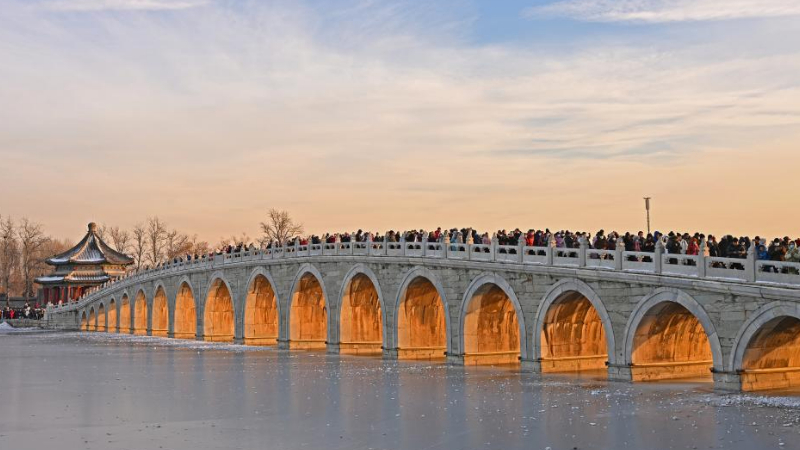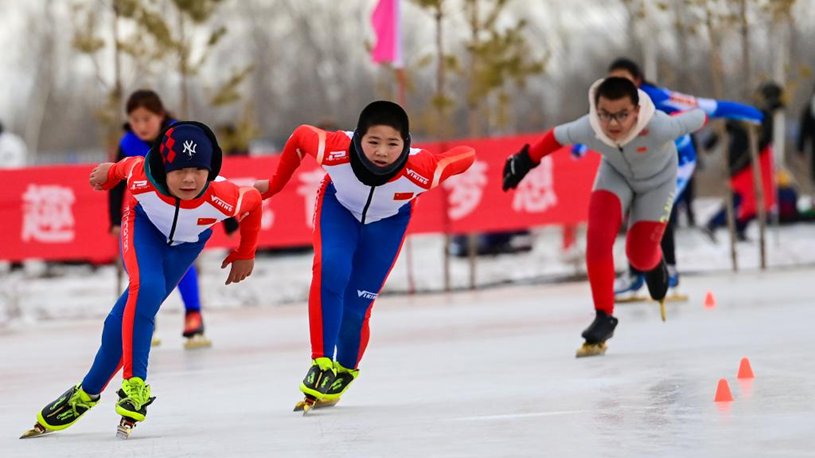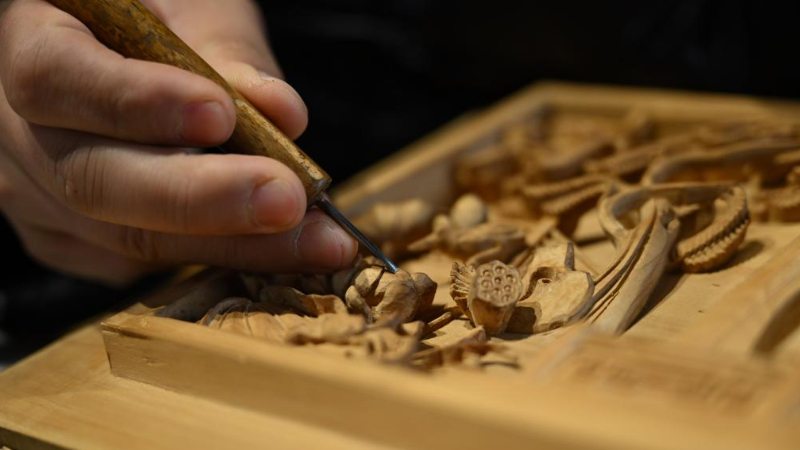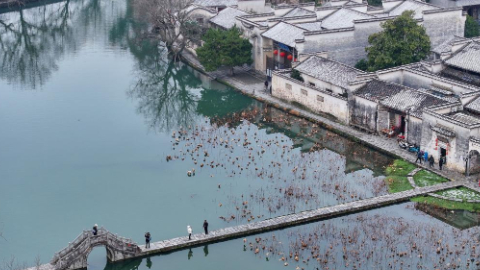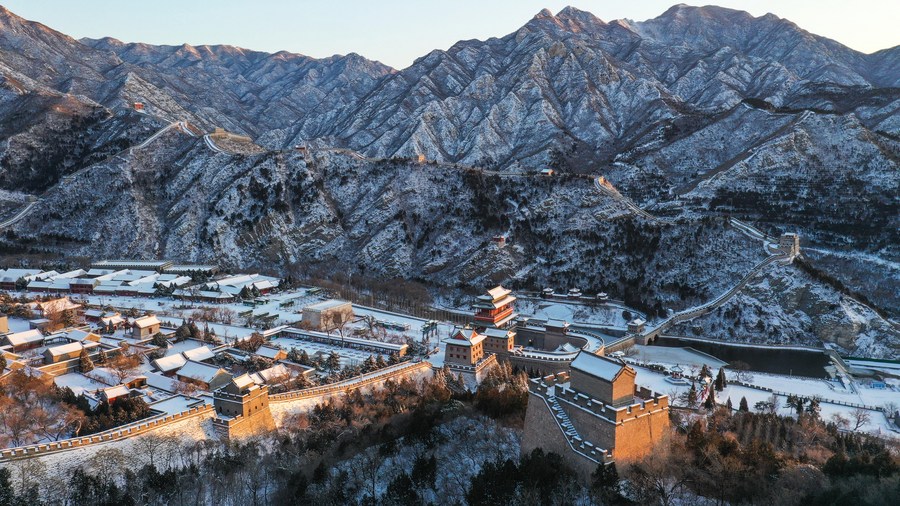
This aerial photo taken on Dec. 16, 2023 shows the snow scenery at the Juyongguan section of the Great Wall in the sunlight in Beijing, capital of China. (Xinhua/Chen Yehua)
BEIJING, Dec. 23 (Xinhua) -- Walking along a section of the Great Wall built in the Ming Dynasty (1368-1644) in Datong Hui and Tu Autonomous County in Xining City, northwest China's Qinghai Province, Tian Shenglong snapped photos of the ancient remain, recording every detail.
As a volunteer protector of the Datong section of the Great Wall, Tian attends special training sessions on Great Wall protection every year.
"When I was a child, few people knew that the 'side wall' not far from where we lived was actually a part of the Great Wall. There was very little awareness of its protection back then," recalled Tian.
Today, however, things have changed. Tian counts himself among the province's 127 volunteer protectors of the Great Wall.
PROTECTION FIRST
Qinghai's protection initiative is part of China's ongoing effort to build the Great Wall national cultural park, which started in 2019.
The iconic Great Wall is China's most colossal cultural heritage structure. It is often described as a tangible embodiment of the virtues ingrained in the Chinese nation. These virtues encompass solidarity, patriotism, tenacity, unwavering self-improvement, advocacy for peace, openness, and inclusiveness.
As part of China's endeavor to construct five prominent national cultural parks, the Great Wall cultural park spans 15 provincial-level regions including Beijing, Hebei and Inner Mongolia in the north, and Gansu and Xinjiang in the northwest.
It comprises Great Wall sections and defense systems with features of the Great Wall dating back to the Warring States period (475-221 BC).
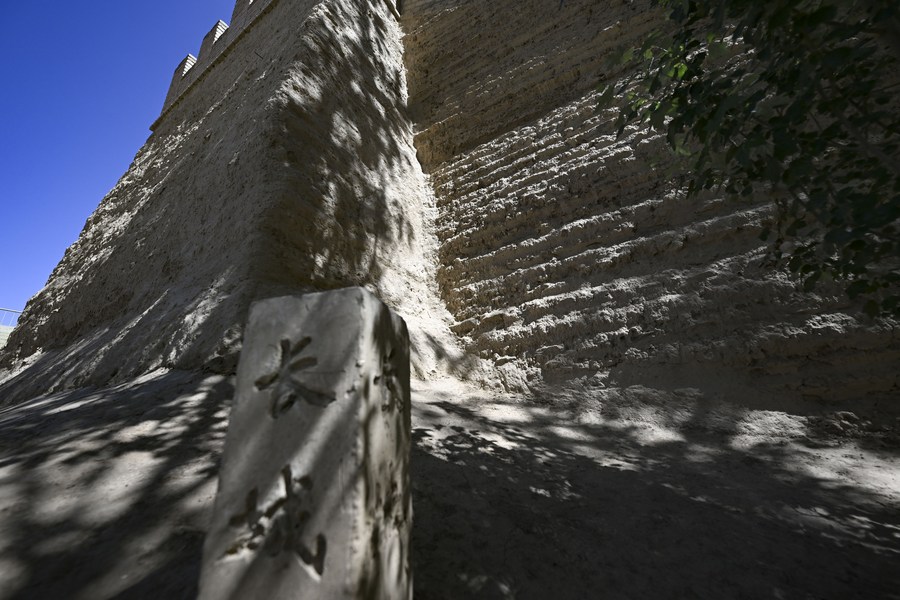
This photo taken on July 13, 2023 shows a part of reinforced wall in Jiayuguan City, northwest China's Gansu Province. (Xinhua/Chen Zhonghao)
Boasting one-third of the country's Great Wall-related resources, Inner Mongolia rolled out a regional construction and conservation plan concerning the Great Wall cultural park in January 2022.
The plan demarcated the protection and conservation areas for the Great Wall and the surrounding environment in key areas.
Progress has been made in the building of the park's major sections including the exhibition area, culture and tourism area, and utilization area.
In northwest China's Gansu Province, a new round of maintenance work for another section of the Great Wall has just been completed.
"The construction of the Great Wall cultural park must always prioritize protection," said Qiu Jian, deputy head of the provincial cultural relics bureau.
According to Qiu, the country has invested nearly 520 million yuan (about 73.3 million U.S. dollars) in recent years, supporting Gansu in implementing more than 90 projects for the protection and maintenance of the Great Wall.
Early this year, an exhibition featuring research and digitization of the Great Wall attracted flocks of visitors to the Tianjin Museum in north China.
The exhibition was based on a project undertaken by a team from Tianjin University to collect full-scale 3D images of the Great Wall. The team has so far completed the survey of the Great Wall sections with a total length exceeding 6,000 kilometers and obtained over 3 million images of the Great Wall with centimeter-level resolution.
CULTURAL APPEAL
Cultural inheritance has stood front and center in the building of the Great Wall cultural park.
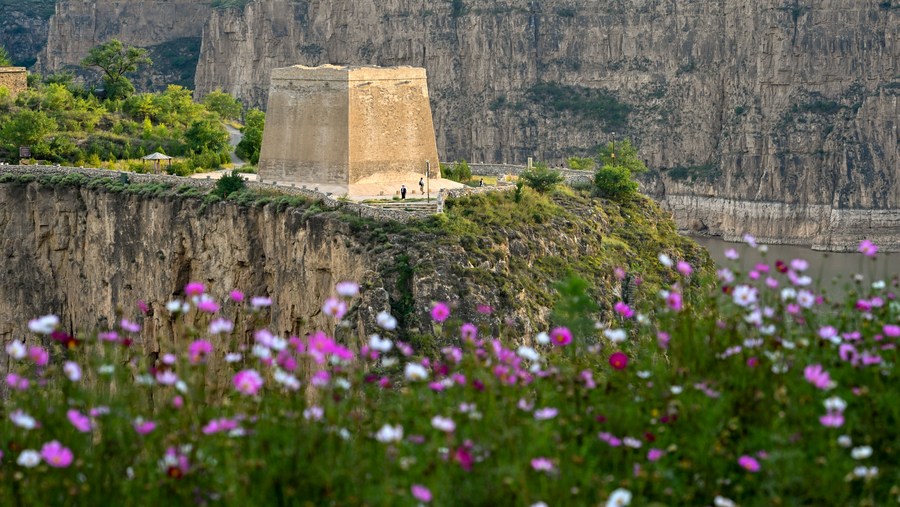
This photo taken on Aug. 23, 2023 shows a section of the Great Wall built during the Ming Dynasty (1368-1644) in Laoniuwan, a border area between Qingshuihe County of north China's Inner Mongolia Autonomous Region and Pianguan County of north China's Shanxi Province. (Xinhua/Liu Jinhai)
The floor-to-ceiling glazing at a Great Wall museum in Qinhuangdao City, north China's Hebei Province, offers visitors a striking vista encompassing the Great Wall and a nearby mountain.
The museum is a flagship project of the province's Great Wall cultural park. Construction of the major structure and installation of major equipment have been finished. Equipment adjustment, trial and commission are underway.
Once completed, it will provide a platform to display the Great Wall culture and the intangible cultural heritage along the Wall, said Feng Zhen, deputy curator of the museum.
More than 1,000 kilometers to the west, study tours to the Great Wall have been increasingly embraced by primary and middle school students in the city of Yulin, northwest China's Shaanxi Province.
Primary students discuss the Great Wall and how to conserve it in their lessons. Before long, they will be able to feel and touch the Great Wall at another facility, as a local themed museum has finished most of its construction.
MORE INCOME FOR LOCALS
For Sun Yugui, a villager in Yanchi County, northwest China's Ningxia Hui Autonomous Region, the charm of the Great Wall is evident in the tourists who arrive in one group after another.
Sun runs a themed homestay business in the county. The county is nicknamed an open-air museum of the Great Wall.
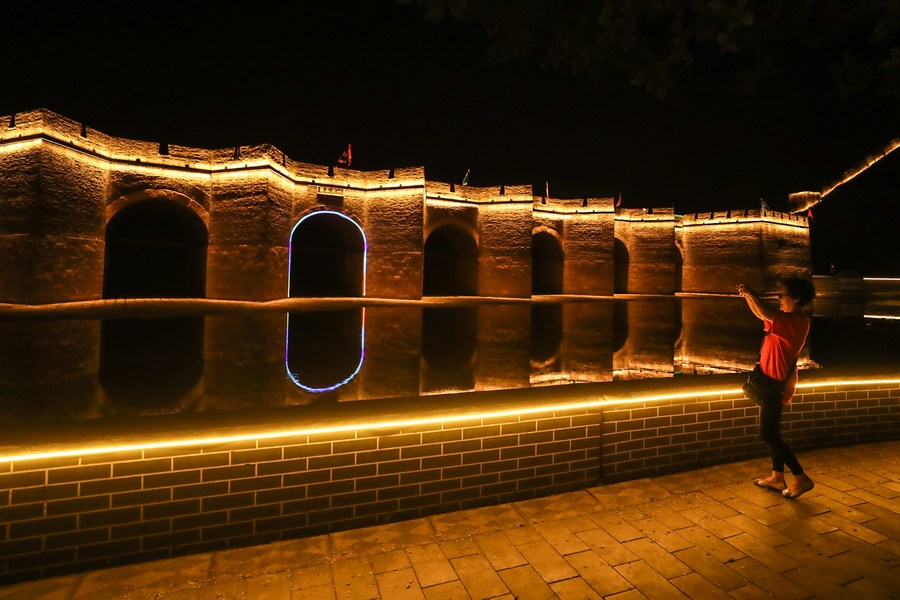
A tourist takes photos at the Jiumenkou Great Wall scenic spot in Huludao, northeast China's Liaoning Province, June 30, 2023. (Xinhua/Pan Yulong)
Locals like Sun are able to benefit financially from the Great Wall, thanks to the construction of the national cultural park.
The sightseeing trails along the Great Wall have been connected to each other within the county, linking up villages along its route like a string of pearls, said Li Yuexin, a local official.
Similar changes are taking place in Suizhong County in northeast China's Liaoning Province.
When night falls, the decoration lights are turned on and the Great Wall shows its contours. It is like a golden dragon flying in mountains, wowing tourists coming from afar.
The themed park received more than 100,000 visits in three months after a night tour program was launched, said Wang Jianhua, an official in charge of archaeology and cultural artifacts' protection in the county. ■

